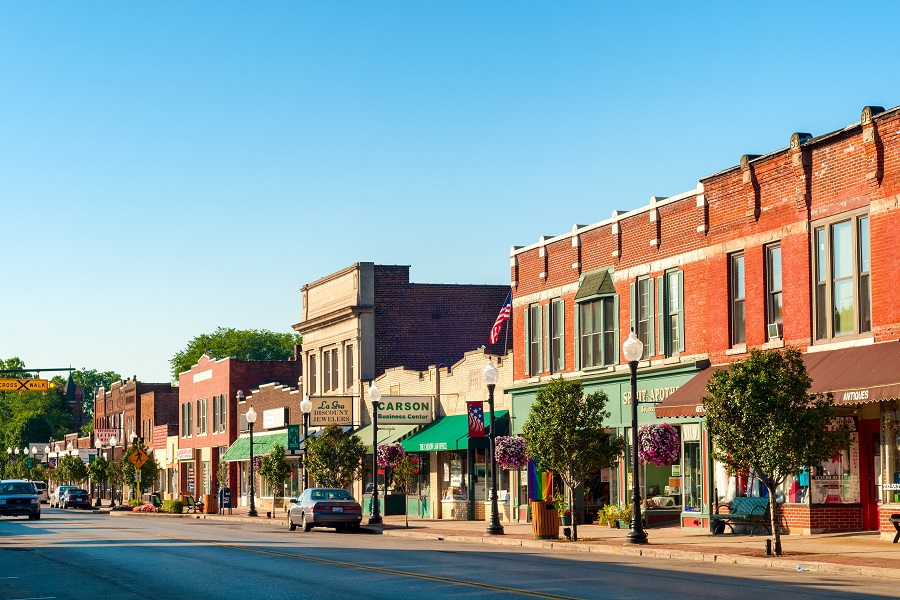Building Communities—and Working for Change—in America’s Heartland

To help build a sustainable and equitable future within and beyond America’s rural and small-city communities, funders will have to look past geographic, racial, cultural, and ideological divides.
As lifelong residents of the Midwest, we have seen firsthand the impact that 25 years of accelerating economic disinvestment and cultural isolation have had on rural families, communities, and economies. Globalization, the digital divide, big box retail, predatory corporate agribusiness, and fossil fuels have taken a toll on life in rural areas and small cities. We have also seen the ways political actors have manipulated racial and social divides, too often preventing urban, suburban, and rural voters from aligning on policies with collective benefits for their communities. Meanwhile, philanthropy has largely forgotten about places like the ones where we grew up.
For a growing number of donors, the 2016 election was a wake-up call, clearly indicating that we need to re-engage with these communities and their concerns to achieve philanthropic priorities related to health care, immigration, education, economic development, climate and environmental justice, civil and voting rights, and more. Even among these donors, however, discussions about how best to engage often fall prey to assumptions and narratives that pit rural communities against urban ones, communities of color against the white working class, and progressive organizing and movement building against efforts to bridge a broader portion of the political and ideological spectrum.
The reality on the ground in rural and small-city America is far more complex—and in many ways more promising—than these stereotypes suggest. Rural America is almost as racially and ethnically diverse as the nation itself (the difference in diversity is just 14 percent). And people of color and Native Americans accounted for 75 percent of population growth in rural and small-town communities between 2000 and 2010.[1]
New, diverse coalitions are forming to work across racial and ideological divides on issues of concern to their communities, including water, energy, democracy, health care, economic development, and agricultural policy. For example, the Missouri Rural Crisis Center—a membership organization of family farmers—is partnering with the Organization for Black Struggle to challenge racism in Missouri and to promote a more sustainable and equitable food system by building unity and mutual understanding among both rural and urban communities. In Ohio, a broad coalition of labor, faith, social justice, farmer, and environmental advocates just passed a bipartisan proposal to reform gerrymandering in the state with 74.8 percent of the vote. And in Michigan, social justice advocates in Flint and Detroit have joined rural and Native American activists to fight the privatization of water.
Funders looking to advance meaningful social, economic, and racial justice are beginning to empower these resourceful, diverse, and too-often-invisible communities to organize around common values and interests. “All the People, All the Places,” a new paper published by the New Venture Fund with support from the Wallace Global Fund and written by Ben Goldfarb, the former executive director of Wellstone Action in Minnesota, offers an analysis of innovative strategies for building collective power and strong civic engagement in small cities and rural areas across the country. It argues that many funders’ objectives will become increasingly difficult to realize unless we reverse the growing cultural and partisan divides between urban, suburban, and rural communities.
With this challenge and opportunity in mind, Arabella is working with two donors with deep roots in rural communities—the Franciscan Sisters of Mary and the Wallace Global Fund—to launch the Heartland Fund. This new pooled donor fund aims to build the power of vulnerable communities to advocate for a just, sustainable, and equitable future for the Midwest. The Franciscan Sisters of Mary is a Catholic faith congregation with a 150-year history of health care ministry in the region, and many of its sisters come from small farm families. In their philanthropy, the sisters are deeply committed to compassionate care of Creation, in collaboration with others. The Wallace Global Fund is inspired by the progressive vision of its founder, Henry A. Wallace, who grew up in Iowa and as vice president championed what he called the “common man” in the struggle against the moneyed elites for control of government and the planet’s precious resources.
Guided by the values shared by the Franciscan Sisters and the Wallace Global Fund, the Heartland Fund will support diverse local leaders and organizations to promote social, environmental, and economic common cause across racial and urban/rural divides in the region. Later this week, the Heartland Fund is excited to partner with the Neighborhood Funders Group, 11th Hour Project, UU Veatch, and Greater New Orleans Funders Network to co-sponsor a learning tour of rural organizing in Missouri. Funders will have the opportunity to learn about the Missouri Rural Crisis Center’s efforts to build power in rural Missouri.
We view these efforts as part of an increasing turn toward state-based and regional philanthropy, developing more inclusive strategies that address historical funding disparities in communities of color and rural and small towns alike. By funding strong local leaders and organizations in urban and rural communities who are building bridges across racial, cultural, and ideological divides, donors can help overcome polarization of all sorts, and support progress and prosperity in all places.
To learn more about the Heartland Fund, contact Ryan Strode or Scott Nielsen.
[1] Housing Assistance Council. “Race and Ethnicity in Rural America.” 2012.
